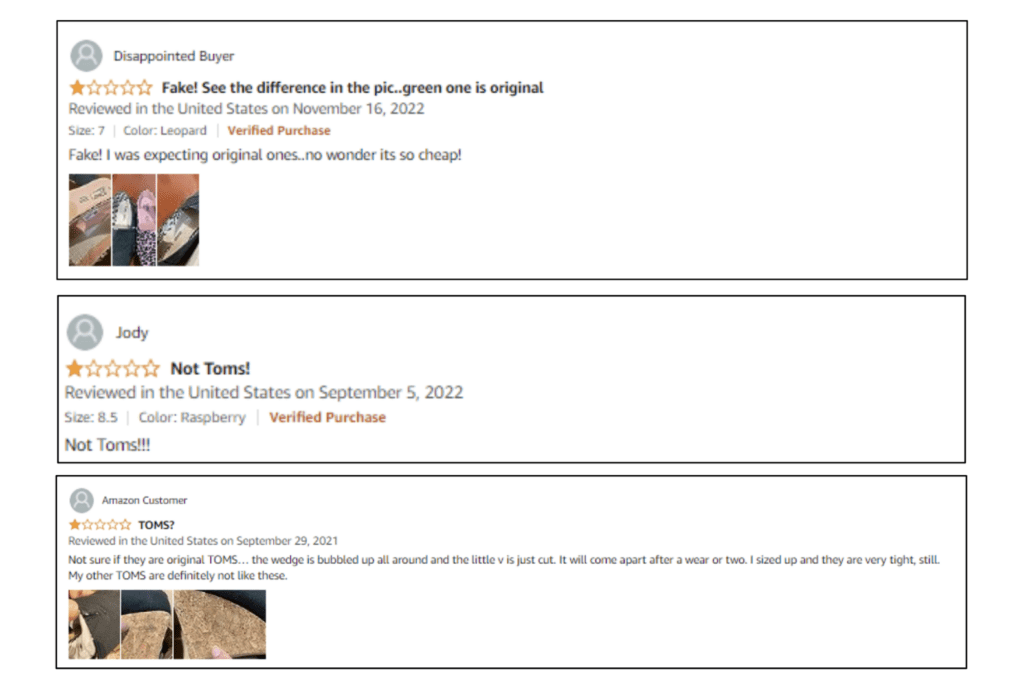TOMS Shoes is targeting Bloom Trading with allegations of trademark infringement and unfair competition over its alleged sale of counterfeit and “non-genuine” footwear products. In the newly filed case, which is playing out in the U.S. District Court for the Central District of California, TOMS alleges that Bloom Trading and its CEO Arsanious Youseff, along with other unnamed defendants (collectively, the “defendants”), are selling inauthentic footwear products that bear the TOMS trademarks and “advertising [them] as new and genuine TOMS products.” In addition to offering up “potentially counterfeit” footwear products, TOMS claims that the defendants are also selling “used, dirty, poor-quality … and otherwise non-genuine products bearing TOMS’ trademarks.”
The problem, according to TOMS, appears to be two-fold. The defendants – who are not “authorized sellers” of TOMS products – are allegedly selling “potentially counterfeit” products, while also reselling TOMS footwear that is not subject to TOMS’ quality controls, thereby, transforming otherwise-authentic products into infringing ones.
On the latter front, TOMS asserts that as part of its “TOMS Guarantee,” it and its authorized retailers provide customers who are dissatisfied with a TOMS product with the ability to request a refund or credit. “The TOMS Guarantee is a material component of genuine TOMS products,” the company claims. Because at least some of the products that the defendants are selling do not come with that Guarantee, they “are materially different from genuine TOMS products,” and thus, inauthentic.
According to TOMS, the defendants’ “unauthorized sale of non-genuine products bearing the TOMS Trademarks is likely to, and does, create customer confusion because customers who purchase products from the defendants believe they are purchasing genuine TOMS products that come with the TOMS Guarantee when, in fact, they are not.” The issue here is compounded by the fact that marketplaces like Amazon have “an exceedingly low barrier to entry,” the company points out. This means that any person who is able to obtain a brand’s products can resell them “while concealing that they are an unauthorized seller who is outside of, and does not abide by, the brand owner’s quality controls,” TOMS states in its complaint.
Hardly an inconsequential practice, TOMS argues that “when a consumer receives a non-genuine, damaged or poor-quality product from an unauthorized seller, such as the defendants, the consumer associates that negative experience with TOMS.” As a result, the defendants’ “ongoing sale of non-genuine products bearing the TOMS trademarks” harms both consumers and the TOMS brand. As evidence of the damage that it is suffering as a result of the defendants’ actions, TOMS points to negative Amazon reviews, including ones that refer to the products being offered up by the defendant as “fake,” “not original TOMS,” “moldy,” poorly packaged, etc.

With the foregoing in mind and given that the defendants “have not responded to any of TOMS’ letters and continue to advertise and sell products bearing the TOMS trademarks through [their] Amazon storefront,” TOMS sets out trademark infringement, unfair competition, unfair and deceptive business practices, and tortious interference with contractual relations causes of action.
Beyond statutory damages and a permanent injunction to stop the defendants’ alleged infringement, TOMS is also looking for the court to order the defendants to “take all action, including but not limited to, requesting removal from the Internet search engines (such as Google, Yahoo, and Bing), to remove from the Internet any of the TOMS trademarks which associate TOMS’ products or the TOMS trademarks with the [defendants] or the [defendants’] websites” and from third-party marketplace websites, including Amazon, Walmart, and eBay.
THE BIGGER PICTURE: The case at hand illustrates growing concerns over brand protection in the digital age, as companies across industries struggle in the fight against counterfeit and/or unauthorized products, which have proliferated thanks to the growth of marketplace sites and other online resale platforms. As TOMS asserts in its complaint, “while online marketplaces have created a great deal of opportunity, they also greatly challenge a brand owner’s ability to control the quality and safety of its products,” particularly as they are “overrun by unauthorized sellers who have no relationship with (or obligations to) brand owners who exercise quality controls over their products sold by authorized sellers.”
In addition to fighting traditional counterfeits or other infringing goods, companies like TOMS, are also facing a rise in the sale of otherwise authentic goods that have not been authorized for sale and/or that fall outside of their quality control systems.
Hardly the first company to take issue with the unauthorized sale of products bearing its trademarks, Otter Products filed suit against reseller Triplenet for offering up products bearing its OtterBox trademarks on various e-commerce marketplace sites. Part of the issue, according to Otter Products, was that Triplenet was erroneously advertising the products as “100% authentic” when they were “materially different from genuine Otter products because they [did] not come with the Otter warranty,” as the company’s warranty only extends to products sold by authorized sellers.
In a win for Otter Products and other brands looking for leverage in their fight against unauthorized resellers, the court sided with Otter Products in a decision in 2021, finding, among other things, that Otter “cited uncontradicted evidence establishing that the products sold by Triplenet are not covered by the Otter warranty,” and that this is a “material” difference.
The case is Toms Shoes, LLC v. Bloom Trading, Inc. et al. 2:24-cv-04723 (C.D. Cal.).











